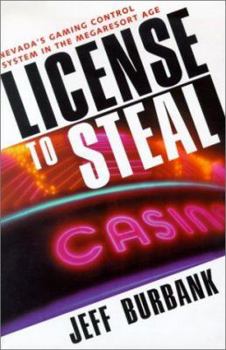License to Steal: Nevada's Gaming Control System in the Megaresort Age
(Part of the Gambling Series)
Select Format
Select Condition 
Book Overview
Seven precedent-setting case studies taken from the files of the Nevada Gaming Control Board illustrate vital issues addressed in the first decade of the megaresorts. This description may be from another edition of this product.
Format:Hardcover
Language:English
ISBN:0874173396
ISBN13:9780874173390
Release Date:August 2000
Publisher:University of Nevada Press
Length:288 Pages
Weight:0.05 lbs.
Dimensions:0.9" x 6.4" x 9.6"
Customer Reviews
1 rating
Feeling Lucky?
Published by Thriftbooks.com User , 17 years ago
If you've ever put a quarter in a slot machine, you might have wondered if the game is fixed or if you actually have a chance of winning. You know that the house always has an edge, but you assume you have a chance of winning, otherwise you wouldn't play, right? In Nevada, where the economy depends on gambling, there are two regulatory agencies, the Gaming Control Board and the Gaming Commission. In general, the Commission licenses casinos and the Board enforces the laws regarding gambling. Together they have a responsibility to make sure the public has confidence in the gambling system. Jeff Burbank used to be a business reporter for the Las Vegas Sun and then the Las Vegas Review-Journal, the two major newspapers in Nevada. He investigated the casino industry from the late 1980s to the mid-1990s. During that time there were a number of landmark cases that the Commission and the Board dealt with. In License to Steal, Burbank describes seven of the most controversial and entertaining cases. One story tells of the casino owner who had a Nazi memorabilia collection that he liked to exhibit to a few hundred close friends from time to time. He'd throw a party, sometimes on Hitler's birthday, to show off the collection. The parties were held in his casino, but not in public view. Word got around (apparently the collection was really something) and the Commission wondered if it shouldn't do something, since one of their mandates is to ensure the licensees (casino owners and operators) don't do anything to give Nevada a bad reputation. It was a touchy problem: a lot of people were offended, but what about freedom of speech? And wasn't it somewhat hypocritical to censure someone for offensive behavior in Las Vegas, which has a bit of a reputation for bad taste? In the end, they fined the casino owner. Even in Las Vegas, there are limits to bad taste. Another story explained how a slot machine manufacturer had programmed its machines to make it look as if losing spins had just missed being winners - "near misses." The owners claimed that the machine wheels would spin randomly, as they are supposed to, but that once the spin had randomly been determined to be a loser, the wheels would re-adjust to show a near miss. This made it more exciting for the player, who would play more. But the regulators thought it might compromise the appearance of randomness. They decided the near miss feature would not be allowed, but when the company appealed on the grounds that retrofitting thousands of machines would be too expensive, the Commission cut them some slack. They still went bankrupt. Then there's the story about a Gaming Control Board employee who found a way to rig the slot machines he tested so they would pay off when a certain sequences of coins was fed into them. Burbank tells how the employee also learned how to predict keno draws, using a computer program, and was trying out the system in Atlantic City, when casino security became suspicious. This was




